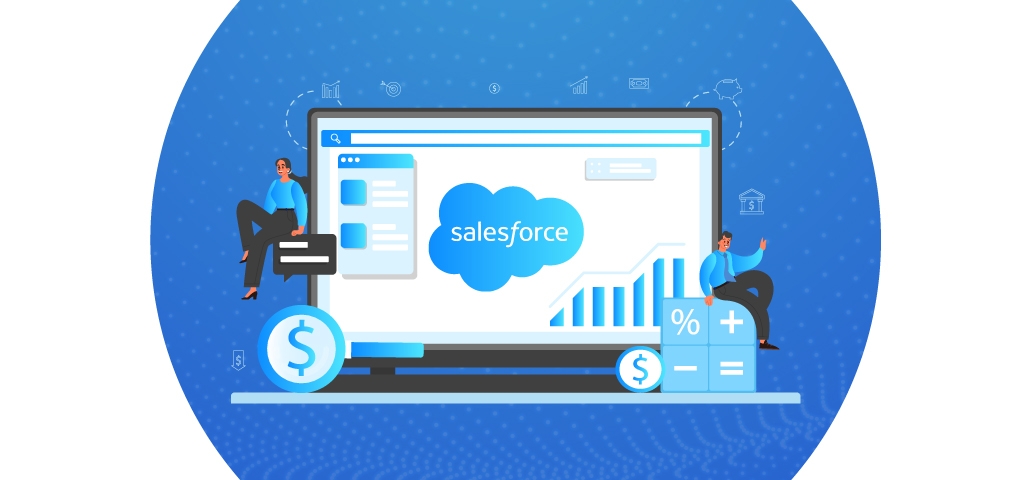
Table of Content
Every business aims to streamline operations, boost customer satisfaction, and drive sales. And implementing a customer relationship management system is one of the most powerful ways to achieve these goals.
Salesforce is a leading CRM platform. Organizations of all sizes use it to centralize customer data, improve workflows, and enhance decision-making.
However, before jumping into Salesforce, one of the most common questions businesses faces is: “How much does Salesforce implementation cost?”
Whether you're a small to medium-sized business (SME) or a large enterprise, understanding the cost of Salesforce implementation is crucial to ensuring a successful roll-out. This blog will guide you with the Salesforce implementation costs in 2025, break down key factors influencing those costs, and provide actionable tips for improving your investment.
Get clear answers and a personalized implementation plan from our experts.
Salesforce is not a software solution; it's an investment in the future of your business. Here’s how Salesforce can help you achieve your business goals:
Salesforce provides a single platform where sales, marketing, and support teams can store and access all customer information. This cuts silos and enables more efficient communication and collaboration.
With built-in analytics and AI tools, Salesforce helps businesses track performance, forecast sales, and find trends, making it easier to make informed decisions.
Salesforce provides tools like automated email campaigns, personalized customer journeys, and omnichannel support to improve customer interactions and drive loyalty.
However, understanding the costs involved is essential to maximizing your investment.
Salesforce implementation costs depend on several factors. The factors include the size of your business, the complexity of the project, and the number of users. Below is a breakdown of salesforce implementation pricing to help you plan:
| Cost Component | Range |
|---|---|
| Licensing | $25 to $300 User/Month |
| Consulting and Strategy | $5,000 to $20,000 |
| Customization | $10,000 to $85,000 |
| Data Migration | $5,000 to $60,000 |
| Training | $500 to $5,000 Per User |
| Post-Launch Support | $10,000 to $45,000 Annually |
Note: These costs are estimates and can vary significantly based on the complexity of your implementation, the specific Salesforce products used, and the industry you work in.
Salesforce offers several product editions designed to cater to different business needs.
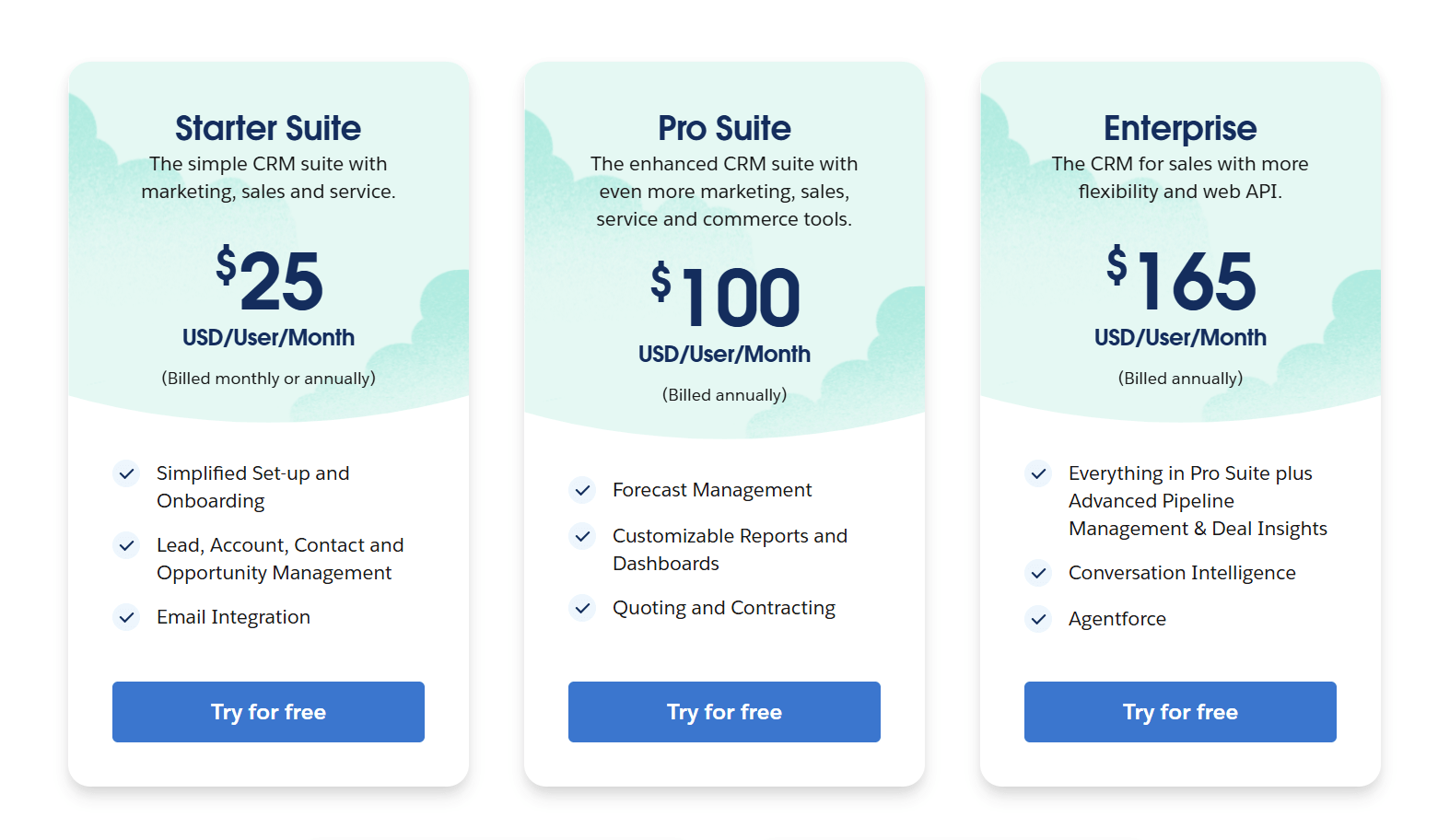
Licensing costs will be one of your most significant ongoing expenses and will vary based on the number of users and the specific Salesforce products you need (e.g., Salesforce Sales Cloud, Service Cloud, Marketing Cloud).
In addition to Sales Cloud, businesses often explore other Salesforce products. The products cater to specific needs, such as Salesforce Service Cloud, Marketing Cloud, CPQ, and Pardot. Here’s a quick breakdown of licensing costs across key Salesforce products:
CPQ (Configure, Price, Quote) helps streamline complex pricing models. And Salesforce CPQ implementation cost starts at $75 per user/month,
Pardot is ideal for marketing automation. The Pardot implementation cost starts at $1,250 per month. It is perfect for businesses focusing on lead nurturing and personalized customer journeys.
Consulting fees are incurred if you hire a Salesforce consulting partner to help guide the implementation process. Consulting partners can offer various services, from project management to custom app development and data migration. Salesforce consulting partner fees generally range from $5,000 to $20,000, depending on the complexity of the project and the consultant's level of expertise.
A predictable, one-time fee based on the project's defined scope.
A flexible hourly rate, ranging from $100 to $300/hour, is ideal for shorter projects or ongoing support.
A cost-effective choice where you can hire part-time Salesforce experts. This is to help with specific tasks or phases, reducing the need for full-time hires.
One of Salesforce's key strengths is its flexibility. But customizing the platform to suit your specific business processes can be a significant expense. Basic customizations (e.g., custom fields, workflows) might cost between $10,000 and $20,000. While more complex projects, such as integrating Salesforce with third-party applications or building custom apps, can exceed $85,000.
Data migration involves transferring data from your current systems into Salesforce. One crucial factor that businesses often overlook during data migration is data quality. Clean, well-organized data can reduce migration costs, while poor-quality data can drive costs up by as much as 50%.
For example, businesses with disorganized data or incompatible formats may need extensive cleaning and mapping. Ensuring your data is clean and compatible with Salesforce beforehand can help you save time and money.
The cost of data migration depends on the volume and quality of the data. Businesses spend an average of $5,000 to $60,000 on data migration.
Even the most advanced Salesforce implementation will fail if your team isn’t trained to use it effectively. Salesforce offers a variety of training options, including online courses, in-person training sessions, and certifications. Training costs can vary from $500 to $5,000 per user.
After the initial implementation, ongoing support is necessary to ensure that the platform continues to run smoothly and that new features are rolled out effectively. Post-launch support can include system updates, troubleshooting, and further customizations, with costs typically ranging from $10,000 to $45,000 per year.
Salesforce implementation costs can vary depending on your location. Businesses in the USA and the UK may face higher labor costs, while India offers more cost-effective solutions. Here's a snapshot of cost differences by region:
Let’s consider a mid-sized business looking to implement Salesforce to illustrate better the costs involved. The company needs 50 users, some customizations, and data migration:
This would bring the total initial implementation cost to $69,500, with ongoing licensing fees of $7,500/month.
Note: This is a hypothetical example; actual costs may vary depending on your business’s size, industry, and specific needs.
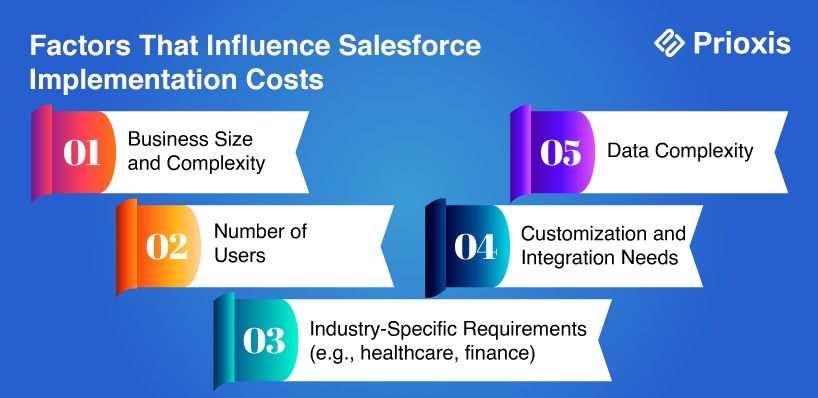
Several factors can affect the total cost of implementing Salesforce. These factors should be considered when budgeting for your project:
The larger your organization, the more complex your Salesforce implementation will likely be. A small business with limited users and standard requirements will typically pay much less than a large enterprise with multiple departments, custom applications, and advanced automation needs.
Salesforce’s pricing is based on a per-user, per-month model. As your team grows, so do your licensing costs. Additionally, more users mean more time and resources needed for training and user adoption.
Every business has unique workflows, and while Salesforce offers many out-of-the-box features, you may need custom solutions to meet your needs fully. The more customizations needed, the higher the implementation cost.
Migrating complex data sets from legacy systems can be challenging, especially if the data isn’t clean or well-organized. If your business has a lot of historical data or data in many formats, this will increase the cost of data migration.
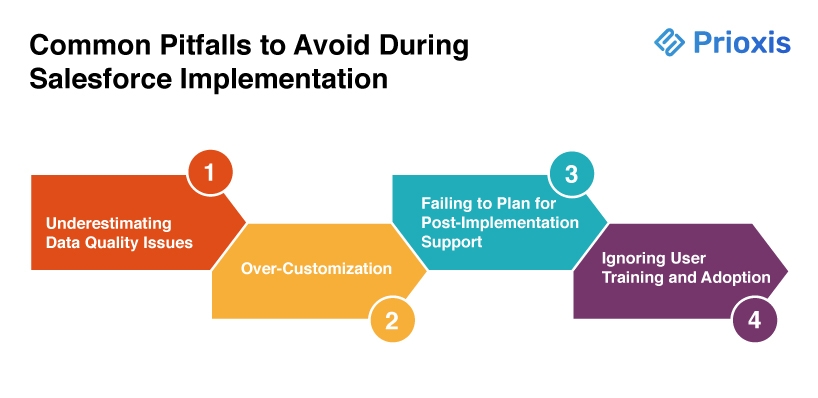
Specific industries, such as finance, healthcare, or manufacturing, may need customizations to meet regulatory or operational requirements. For example, businesses in the healthcare sector may need HIPAA compliance features, which can increase the cost of implementation.
While Salesforce can be a significant investment, there are effective ways to optimize costs. Here are the top strategies:
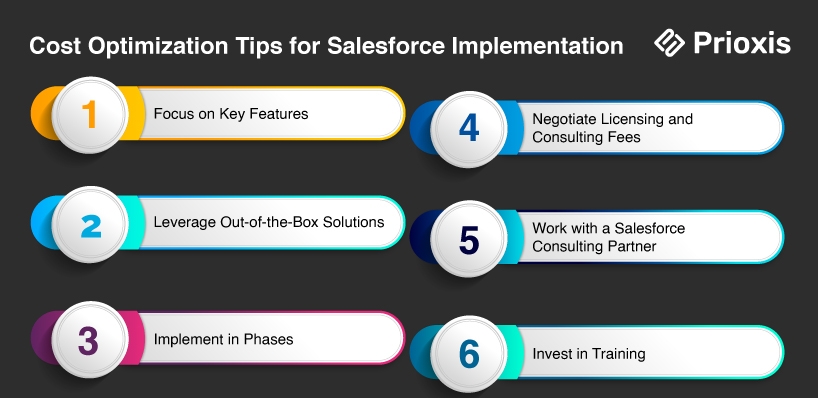
When starting your Salesforce development implementation, focus on the core features that will deliver immediate value to your business. Avoid unnecessary customizations or add-ons that aren’t critical to your current needs. Once your team is comfortable with the basic functionality, you can gradually introduce more complex features, customizations, and integrations.
Focus on the features that address your most essential business use cases. This approach prevents overspending on extras that don’t align with your primary aims.
Instead of rolling out a full Salesforce implementation in one go, consider a phased approach. Begin by implementing the most essential features and add more complex customizations and integrations as your business grows. This will help spread costs over time.
Phasing your implementation can help prevent scope creep and unnecessary expenses. By focusing on high-priority features first, you can gain value early while leaving room for expansion.
Salesforce licenses are a significant recurring expense. Don’t hesitate to negotiate on both licensing and consulting fees.
Assess your actual needs and negotiate a license package that matches your usage without unnecessary extras. Similarly, seek competitive quotes from consultants and negotiate flexible pricing models.
Salesforce consulting partners like Prioxis can help you avoid costly mistakes. They guide the process, from planning and customization to training and support. Consulting partners can also offer flexible pricing models, allowing you to manage costs.
Consider a hybrid approach where you handle simpler tasks internally (e.g., data entry) while consultants focus on complex configurations and strategic advice. This reduces the salesforce consulting partner fee.
Training is crucial for user adoption and maximizing your Salesforce implementation's ROI. Without well-trained users, you may face higher ongoing support costs and underutilization of the platform’s capabilities.
Take advantage of free Salesforce training resources like Trailhead to cut formal training costs. Provide targeted training based on specific user roles.
Different industries have different needs when it comes to Salesforce implementation. This can affect both the cost and complexity of the project. Let’s look at how some specific industries may need specialized Salesforce configurations:
Healthcare organizations need Salesforce customizations to follow regulatory requirements such as HIPAA (Health Insurance Portability and Accountability Act). This often requires more security measures and specific data-handling procedures. It can increase the cost of implementation.
Note: If you're in a specialized industry like healthcare, you can also choose Salesforce Health Cloud. However, it comes with higher pricing tiers (around $250/user).
Financial institutions often need complex workflows for managing accounts, customer data, and compliance tracking. Salesforce offers a dedicated Financial Services Cloud but implementing it can need extensive customization to match the specific needs of each institution.
For retail and e-commerce businesses, Salesforce needs to integrate with online sales platforms, inventory management systems, and customer support tools. These businesses may need advanced automation for order tracking, customer support, and marketing campaigns, which can increase customization and integration costs.
Let Prioxis’s certified Salesforce specialists design a clear, effective roadmap for your organization’s seamless CRM transformation.
If you're considering Salesforce for your business, it’s important to understand your specific needs. Plus, how they will influence the total cost of implementation. Here are some steps to help you estimate your costs:
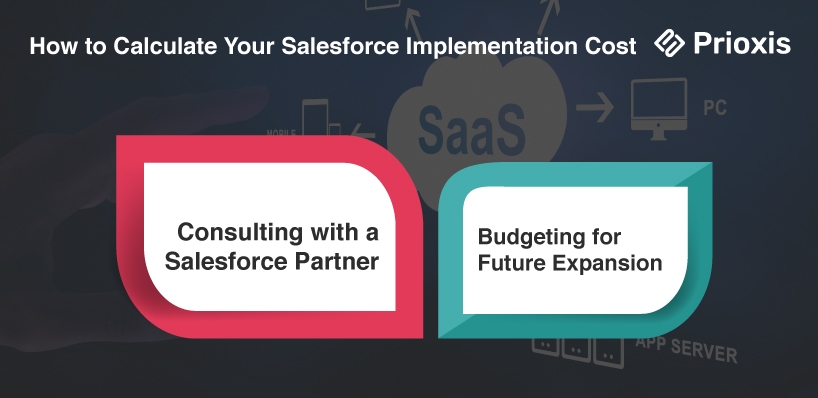
A certified Salesforce consulting partner can offer a more accurate estimate after assessing your business needs. They will work with you to develop a detailed implementation plan, covering everything from licensing to data migration, customization, and training.
As your business grows, your Salesforce instance will need to scale with it. When estimating costs, make sure to include future expenses such as adding new users, customizations, or integrations as needed. Also, a budget for post-launch support to keep the system running.
Implementing Salesforce is a significant investment, but the value it can bring to your business is immense. It’s crucial to understand the factors that contribute to Salesforce implementation costs to avoid overspending.
To make the most of your Salesforce investment:
Start by finding your core needs and add more features and customizations as necessary.
Prioxis can guide you through the process, ensuring that you avoid common pitfalls.
Ensuring that your team adopts the platform is key to maximizing its value.
If you're ready to explore Salesforce for your business, contact Prioxis for a free consultation. Our team of experts can help you navigate the costs and ensure a smooth implementation.
Get in touch